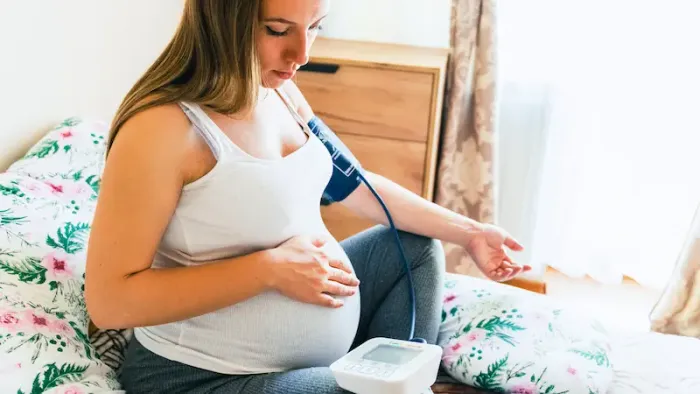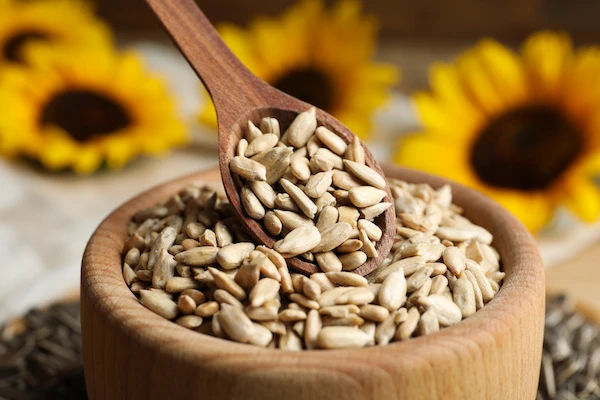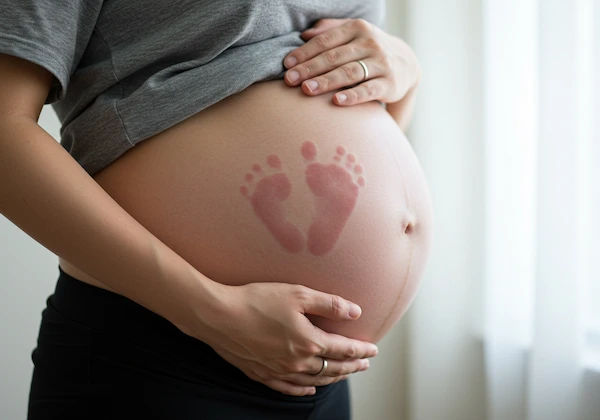Natural Ways to Manage Low Blood Pressure During Pregnancy
Learn about safe and effective natural treatments for low blood pressure during pregnancy. Discover home remedies, dietary changes, and lifestyle tips to manage your symptoms and ensure a healthy pregnancy.

Written by Dr. Rohinipriyanka Pondugula
Reviewed by Dr. Dhankecha Mayank Dineshbhai MBBS
Last updated on 13th Jan, 2026

Introduction
Feeling a wave of dizziness when you stand up? You're not alone. Low blood pressure, or hypotension, is an incredibly common experience during pregnancy, particularly in the first and second trimesters. While high blood pressure often steals the spotlight in prenatal care, navigating the lightheadedness and fatigue of low BP is a real concern for many expectant mothers. The good news is that this is usually a normal physiological response to the amazing changes your body is undergoing and is often manageable with simple, natural strategies. This guide will walk you through the causes, reassure you about the risks, and provide a comprehensive toolkit of safe, effective natural treatments for low bp during pregnancy. From dietary tweaks to posture changes, we’ll cover everything you need to know to feel more steady and energized throughout your journey.
Understanding Low BP in Pregnancy: What's Normal?
Pregnancy triggers a cardiovascular rollercoaster. Your blood volume increases by up to 50% to support your growing baby, but your blood vessels also dilate due to the hormone progesterone. This combination can sometimes cause a drop in blood pressure, peaking around midpregnancy. It's generally considered a sign that your body is adeptly redirecting blood flow to your uterus and placenta. Understanding this "why" is the first step to managing it without panic.
Why Does Blood Pressure Drop When You're Pregnant?
The primary culprits are hormonal and physical. The hormone progesterone relaxes the walls of your blood vessels, leading to vasodilation (widening), which lowers resistance and thus blood pressure. Simultaneously, your expanding circulatory system is working to fill a much larger network, which can temporarily dilute your blood pressure readings. This is often most pronounced in the second trimester, easing up as you approach your third trimester.
Common Symptoms of Pregnancy Induced Hypotension
Recognizing the signs helps you respond quickly. The most common symptoms of low bp during pregnancy include:
Dizziness or Lightheadedness: Especially when moving from sitting or lying down to standing (known as orthostatic hypotension).
Nausea: A feeling of queasiness that isn't necessarily morning sickness.
Blurred or Tunnel Vision: A temporary change in eyesight when you feel faint.
Fatigue: An overwhelming sense of tiredness that seems disproportionate to your activity level.
Rapid, Shallow Breathing: As your body tries to compensate.
Cold, Clammy Skin: Another sign of your body's stress response.
Fainting (Syncope): Although less common, it is the most serious symptom and requires immediate attention.
Top Natural Remedies for Low BP in Pregnancy
Before reaching for medication, which is rarely needed, several highly effective natural approaches can help you stabilize your blood pressure and alleviate uncomfortable symptoms of hypotension in pregnancy.
Hydration and Electrolytes: Your First Line of Defense
Dehydration is a major trigger for low BP. When you're pregnant, your fluid needs are significantly higher. Aim for at least 810 glasses of water daily, and more if you're active or it's hot. But it's not just about water; it's about electrolytes—minerals like sodium, potassium, and magnesium that help regulate fluid balance.
Beyond Water: ElectrolyteRich Drinks and Foods
While plain water is essential, sometimes you need more. Incorporate natural electrolyte sources:
Coconut Water: A fantastic natural source of potassium.
Buttermilk (Chaas): A traditional Indian drink that provides sodium and hydration.
Fruit Infusions: Add slices of orange, lemon, or watermelon to your water for a potassium and flavor boost.
Homemade Lemonade with a Pinch of Salt: A simple and effective DIY electrolyte drink.
Consult a General Physician for the best advice
Dietary Adjustments to Stabilize Blood Pressure
What you eat plays a pivotal role in managing low bp during pregnancy.
The Power of Small, Frequent Meals
Large meals can cause blood to rush to your digestive tract, pulling it away from your brain and leading to postprandial hypotension (a drop in BP after eating). Instead of three big meals, opt for five to six smaller, well-balanced meals and snacks throughout the day. This helps maintain steady blood sugar and blood pressure levels.
Smart Sodium: Using Salt Safely
While often vilified, sodium is crucial for maintaining blood volume and pressure. If your doctor has not diagnosed you with hypertension, adding a moderate amount of salt to your diet can be beneficial. A pinch of high quality sea salt or Himalayan pink salt in your food or in your lemon water can help. Always discuss this with your healthcare provider first, especially if you have any kidney issues.
Mastering Your Movement and Posture
How you move can prevent sudden drops in BP.
How to Get Up Without Getting Dizzy?
The key is slow and deliberate movement. When getting out of bed, first sit on the edge for a full minute, with your feet dangling. Then, plant your feet firmly on the floor and stand up slowly, holding onto something stable if needed. This gives your circulatory system time to adjust to gravity.
The LeftSide Lying Position for Better Circulation
When resting or sleeping, try to lie on your left side. This position takes pressure off your inferior vena cava (the large vein that returns blood to your heart), improving circulation and blood flow to your heart, brain, and, most importantly, your baby.
The Role of Gentle Exercise and Rest
Contrary to intuition, gentle exercise like walking or prenatal yoga can help regulate blood pressure by improving overall circulation and vascular tone. However, balance is key. Listen to your body. Overexertion and standing for long periods can worsen symptoms. Prioritize rest and elevate your feet when possible to help venous return.
When to Be Cautious?: Beyond Natural Management
While natural home remedies for low bp are effective for most, it's vital to know when to seek professional help. Low BP is usually benign, but persistent, severe symptoms can indicate an underlying issue or lead to complications like falls.
Signs You Should Call Your Doctor
Contact your healthcare provider immediately if you experience:
Frequent fainting spells.
Dizziness that is severe and persistent, interfering with daily life.
Chest pain or palpitations.
Blurred vision that doesn't resolve quickly.
Headaches that are severe and new.
How Apollo24|7 Can Help You Manage Your Pregnancy Health?
If your symptoms are worrying but not an emergency, or if you want personalized advice on managing your blood pressure, consulting a doctor is the best step. You can consult a gynecologist online with Apollo24|7 from the comfort of your home to discuss your symptoms and get tailored advice. They can help you determine if your low BP is within a normal range or requires further investigation. For a comprehensive check, Apollo24|7 also offers convenient home collection services for basic blood tests to rule out causes like anemia, which can exacerbate feelings of fatigue and dizziness.
Quick Takeaways: Managing Low BP at a Glance
Hydrate Smartly: Drink plenty of water and include natural electrolyte sources like coconut water.
Eat Little and Often: Opt for small, frequent meals to avoid postmeal dizziness.
Move Mindfully: Always get up slowly from sitting or lying down.
Rest on Your Side: Prioritize left side lying to improve blood flow.
Consider Salt: With your doctor's okay, a moderate amount of salt can help.
Wear Support Stockings: Compression stockings can improve circulation in your legs.
Listen to Your Body: Rest when you need to and avoid overexertion.
Conclusion
Navigating low blood pressure during pregnancy can be unsettling, but it's important to remember that it is most often a normal, temporary part of the incredible process of growing a new life. By understanding the causes—hormonal shifts and expanded blood volume—you can empower yourself with practical, natural strategies. From prioritizing hydration with electrolytic fluids and adopting a diet of small, frequent meals to mastering the art of slow movement and restorative rest, you have a powerful toolkit at your disposal. These methods are generally safe and effective for managing the dizziness and fatigue that can accompany this condition. However, always trust your instincts. If your symptoms feel severe or persistent, don't hesitate to seek professional guidance. Your health and your baby's health are paramount. Book a physical visit to a doctor with Apollo24|7 if you need an in-person evaluation to ensure everything is progressing perfectly.
Consult a General Physician for the best advice
Consult a General Physician for the best advice

Dr. Rajib Ghose
General Physician/ Internal Medicine Specialist
25 Years • MBBS
East Midnapore
VIVEKANANDA SEBA SADAN, East Midnapore

Dr. Chandrasekar Chandilya
General Physician/ Internal Medicine Specialist
29 Years • MD, FRCP (Glasgow), FCIP, PGD (Diabetology), FACC (USA)
Chennai
Apollo Hospitals Greams Road, Chennai
(75+ Patients)

Dr. B Sivananda Reddy
General Physician
12 Years • D M ( OSMANIA MEDICAL COLLEGE, KNRUHS ) MD ( KASTURBA MEDICAL COLLEGE , MAHE) MBBS ( PESIMS&R, NTRUHS).
Secunderabad
Apollo Hospitals Secunderabad, Secunderabad

Dr. Ramya Hari
General Practitioner
18 Years • Medical Head & Family Physician, DG Shipping Approved Doctor, Panel Physician - UK Visa Medicals
Chennai
Apollo Medical Centre Kotturpuram, Chennai
Dr. S K Agarwal
General Physician/ Internal Medicine Specialist
43 Years • MD, MNAMS, FICP
Delhi
Apollo Hospitals Indraprastha, Delhi
More articles from pregnancy
Frequently Asked Questions
1. Is low BP dangerous for my baby?
In most cases, no. Mild to moderate low BP is generally not considered dangerous for the baby and is often a sign of good placental blood flow. However, extremely low BP that causes frequent fainting or falls could potentially reduce oxygen flow to the baby and requires medical evaluation.
2. I feel dizzy in my second trimester, is that normal?
Yes, it is very common. Blood pressure often reaches its lowest point around the middle of pregnancy (weeks 1224) due to peak hormonal activity and blood vessel dilation, making dizziness during pregnancy second trimester a frequent complaint.
3. Can I drink coffee to raise my blood pressure?
It's not recommended. While caffeine may temporarily raise your BP, it is also a diuretic, which can lead to dehydration and ultimately worsen low BP in the long run. It's best to focus on hydration with water and electrolyte-balanced fluids.
4. What are the best foods for low bp during pregnancy?
Focus on foods that support hydration and electrolyte balance: fruits like watermelon and oranges, vegetables like celery and cucumbers, healthy salted nuts, soups, broths, buttermilk, and coconut water.
5. When should I go to the hospital for low blood pressure?
You should seek immediate emergency care if you faint and fall, experience chest pain, severe shortness of breath, a sudden severe headache, or neurological symptoms like confusion or slurred speech.




